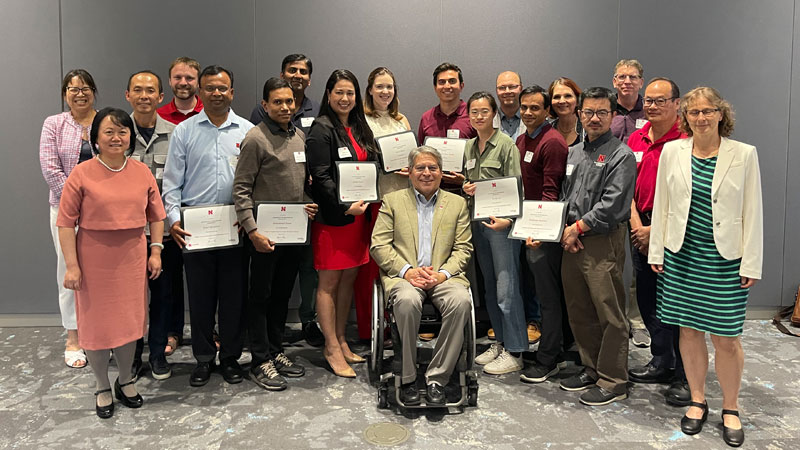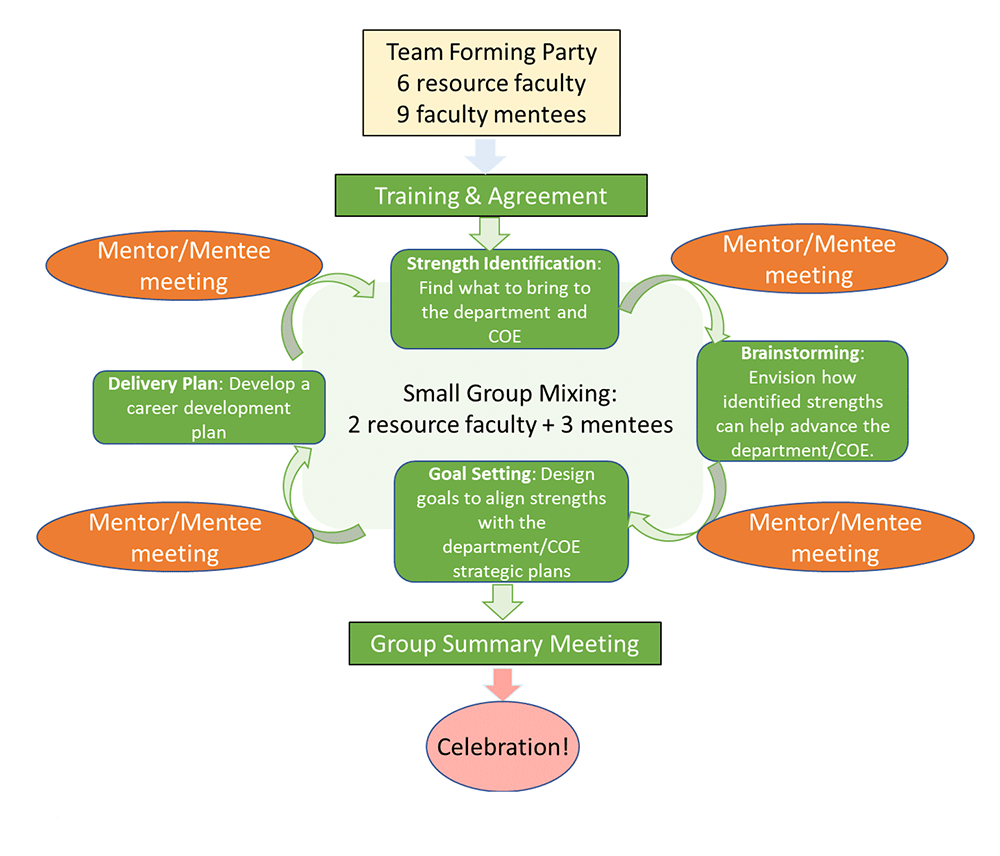
This program intends to be supplemental to, instead of replacing, currently available department-level formal or informal mentoring programs. Also, this program is on top of the COE new faculty onboarding series, which is open to faculty members who joined COE in the past three years.
Program Goals:
The purpose of the New Faculty Mentoring Program is to build a community of faculty excellence and facilitate the career development of junior faculty. Specially, the program will help new faculty members- set achievable professional goals that align with College’s priorities and strategic plans.
- create a realistic and concrete plan to meet their goals.
- manage the demands of research, teaching, service, and work/life balance.
Overall Structure:
The program will consist of a group of resource faculty who take mentoring roles, and a group of new faculty members who are interested in participation. In 2021, the program will consist of six group meetings/mixing sessions throughout the year. In addition, faculty mentees will be required to meet with a resource faculty once a month.
Team Forming:
Resource Faculty: Six resource faculty with diverse backgrounds and expertise in research, teaching, and engagement will be selected across the COE. Resource faculty should have excellent interpersonal skills; willingness to share their wealth of experience; and have rich experience about academic life and culture of the University. Fully promoted or nearly fully promoted faculty members are preferred.Throughout the year, each resource faculty will commit to attending six group meeting/mixing sessions and have six individual meetings with a faculty mentee. Each time a different faculty mentee will be assigned.
Participating in this mentoring program will be counted as 5% of service apportionment for resource faculty members. The department chair will discuss with the resource faculty member regarding the possible reduction of overall teaching/research/service workload due to this service.
Faculty Mentees: The first cohort will include up to 9 new faculty mentees. New faculty members who join COE in fall 2021 will be automatically enrolled in this program; however, new faculty members can choose not to participate by notifying the Associate Dean for Faculty and Inclusion. Selective faculty members who joined COE in 2020 are invited to join the program.
All faculty mentees are required to attend six group meeting/mixing sessions and have four individual meetings with a resource faculty. Each time a different resource faculty will be assigned for the individual meeting.
A welcome reception will be organized for all resource faculty, faculty mentees and the COE leadership committee to meet and start the program. Participation is strongly encouraged.
Training and Agreement:
In the first group meeting, training will be conducted for both mentors and mentees. Training will include interpersonal skills, conflict management, roles of mentors and mentees, etc. The program will be built upon the principle of Appreciative Inquiry, which uses positive language and strength identification to guide the discussion and goal setting.An agreement that specifies the goals and objectives of the program, the roles, responsibilities, and commitment of each member will be provided to mentors and mentees.
Small Group Mixing Sessions:
A series of group meetings are designed throughout the academic school year based on the principle of Appreciative Inquiry. In each meeting, participants will be divided into three small groups, each has two resource faculty members and three faculty mentees. Throughout the semester the combination of the group will be rotated. Four meetings are designed as follows:- Strength Identification Meeting
Faculty mentees will compile a list of strengths in the areas of teaching, research, service/engagement, which they bring to the department and COE. This meeting will also serve as an opportunity for members to know each other better. - Brainstorming Meeting
The group will assess the strengths that they identified during the first meeting. They will brainstorm how those strengths can be used to build the future of the university. It is expected that a lot of creative ideas will be produced from this meeting, which will be accepted or rejected on a consensual basis. - Goal Setting Meeting
The group will determine how they can leverage the identified strengths and the new university and national initiatives. This may lead to collaborations between disciplines to explore new funding opportunities, and/or teaching and engagement innovations. The group will help faculty mentees to ensure that their professional goals well align with COE and UNL’s priorities and strategic plans. - Delivery Planning Meeting
The group will create a career development action plan for each faculty mentee. Resource faculty should share additional internal and external resources (e.g., proposal development and submission resources from ORED; NSF CAREER proposal training workshops) that can help faculty mentee to implement their career development plan.
Mentor/Mentee Meetings:
Following each group meeting, a faculty mentee will be paired with a resource faculty who is not in the same department. Every time, a different resource faculty will be matched to the faculty mentee. This rotation process will allow the faculty mentee opportunities to interact with different resource faculty. The pair should further discuss and finalize what is developed from the previous group discussion and start the conversation for the next group meeting.Throughout the year, each resource faculty will participate in 6 individual meetings. Each faculty mentee will participate in 4 individual meetings.
Group Summary Meeting:
Close to the end of the semester, a whole group meeting will be held. All mentors and mentees will reflect on the program, conduct program assessments, and provide recommendations on how to improve the program. This meeting will also include one topic discussion that is of the most interests of faculty mentees, e.g., work/life balance.Celebration Party:
A celebration party will be held before the semester end. All resource faculty, faculty mentees, and COE leadership committee members will be invited. A Certificate of Completion will be awarded to each faculty mentee. Participating in this mentoring program will be counted as 5% of service apportionment for resource faculty members. The department chair will discuss with the resource faculty member regarding the possible reduction of overall teaching/research/service workload due to this service.Faculty mentees are encouraged to continue consult a resource faculty as their informal outside mentor, who will help them implement and adjust their career plan in the following years. Once a year, faculty mentees will be invited to conduct a survey about their progress on the career development plan.